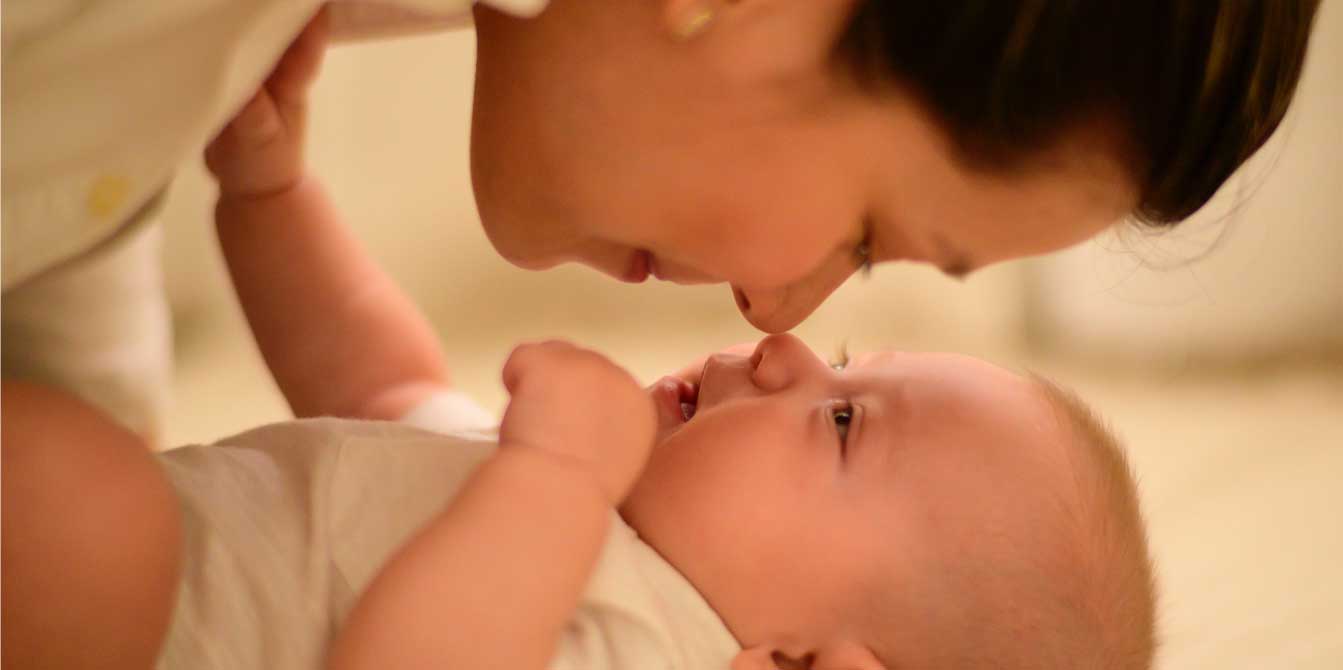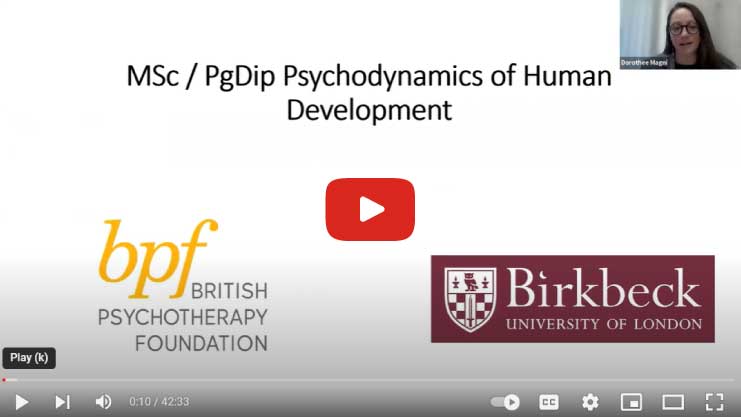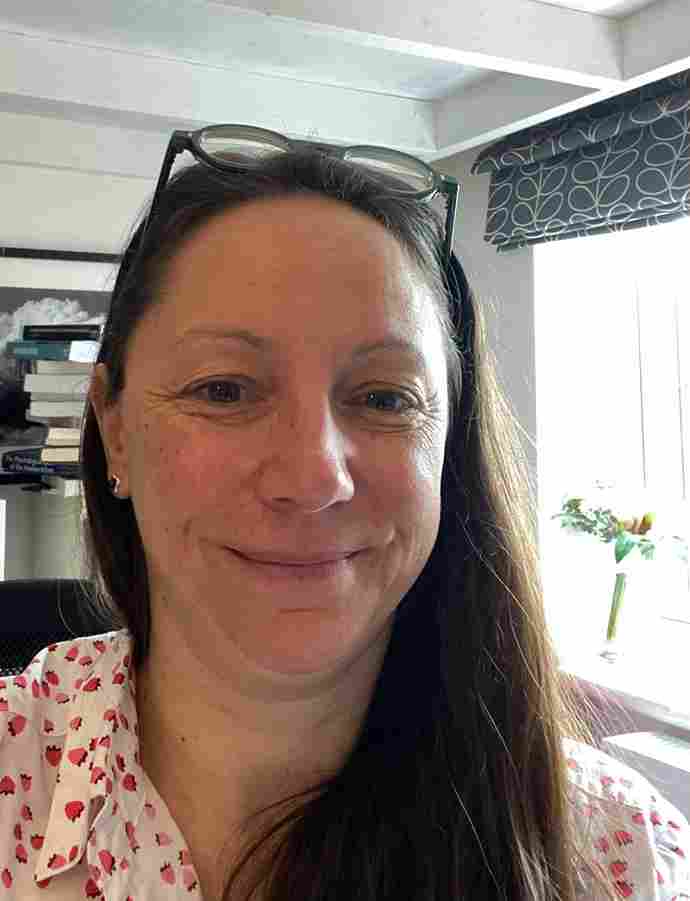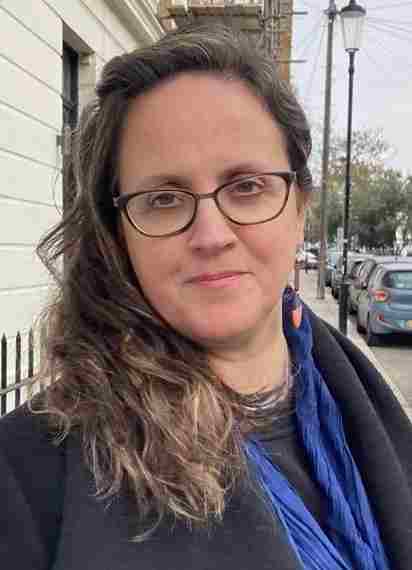
MSc Psychodynamics of Human Development
Training Location: In London or Online.
Part-time course. Course length: 2 years. Wednesday evenings 5-10pm.
Our MSc provides an understanding of human development through a set of theoretical and experiential modules. This pre-clinical course is designed to prepare students for a career in psychotherapy. It is a foundation course that offers an accredited infant observation, and it fulfils the entry requirements for a Child and Adolescent Psychotherapy Doctorate.
Applications open in January for September start. Please contact the MSc Course Coordinator for further information: MSc@bpf-psychotherapy.org.uk
We have now closed submissions for the MSC for 24/25
- Who is it for?
- Course Content
- Entry requirements
- How to apply
- Course fees
- Resources
- Training Pathways
- Meet the Team
- Contact us
This course is tailored for individuals curious about psychotherapy, offering an enriching blend of academic and experiential seminars. This program is a gateway to professional and personal growth, fostering holistic development. It caters to professionals from diverse settings, including community care, counselling, social services, primary care, mental health, education, and any other background.
The two-year part-time MSc prepares students for a career in psychotherapy with adults or children:
Child and Adolescent Psychotherapy
The course is open to students living in the UK for the duration of the course.
Our psychodynamics of human development course provides an understanding of human development through 4 distinct modules over two years:
A two-year infant observation, following an established practice for learning about the psychodynamics of human development through detailed weekly observation of an infant from birth and weekly discussion seminars in a small group with a trained psychotherapist.
Weekly Work Discussion seminars, where students take turn to present an observation of a work setting. The small group led by an experienced psychotherapist focuses on the personal and interpersonal responses and organisational dynamics. Work discussion includes contemporary Jungian concept of the cultural complex and the work of W. Bion and M Klein.
Weekly theory seminars to explore the life cycle with a choice of Jungian Analytic or Psychoanalytic approach:
Psychoanalytic approach
- An introduction to selected core concepts of psychoanalytic thought from the work of Freud, Klein and Winnicott
- Pregnancy and the origins of the relationship between the mother and her baby. The development of the infant as a social human being’
- the emotional, social, cognitive and perceptual and especially communicative skills and attributes of the baby’s development as it becomes a toddler
- adolescence and young adulthood and the of core tasks of adult life – the capacity for intimate relationships and establishing a family
- Contemporary thought on gender, sexuality, racism, politics and the environment
- An examination of how strains and stresses experienced in development impact on adult life
OR
Jungian analytic approach
- Jungian model of the psyche: the self, individuation, collective unconscious, archetypes, transcendent function, symbol formation and dreams
- Jungian baby and child: Fordham’s development of Jungian concepts and psychoanalytic theories of Klein, Bion and Winnicott
- Jungian life cycle: the unfolding of the self in individuation through developmental stages and archetypal contexts including adolescence, mid-life, old age and death
- Contemporary Jungian thought: gender, sexuality, racism, spirituality, neuroscience, synchronicity, culture and collective experience
- Link to Jungian Terms Explained – Helen Morgan and Christopher McKenna’s clear glossary of some Jungian terms
The Dissertation module includes taught seminars on research methods leading to a a research project with a Jungian Analytic or Psychoanalytic lens on contemporary topics of the student’s choice.
Recent research topics include: how teachers understand children’s aggression; the appeal of computer gaming for adult men; post-natal depression in British-Chinese mothers; the impact on feelings of identity in adults raised in a religious cult; the emotional impact of growing up in a boarding school; the experience of palliative care workers in working with the dying; individuation and early retirement; contemporary views on the animus; midlife in the workplace; homeopathy and sickness as symbol; the sense of Self in male to female transsexuals; Jungian perspectives on work with adolescents; spirituality and individuation; the feminine in the cultural unconscious
Please note:
Closing date:
It is recommended that you apply by May. We do accept late applications but we cannot guarantee a place will be available.
For those who complete this course as part of the preclinical requirements for the Child and Adolescent Psychotherapy doctorate:
- the Jungian analytic and the Psychoanalytic streams are equivalent. They both lead to an application to the clinical doctorate.
- MSC and PgDip students complete an infant observation.
- Only students with a previous MA/MSc and students having achieved a 2:1 or above in their first degree can apply to IPCAPA with the Pg Dip (no dissertation).
- Fees for Pg Dip and MSc are the same in the first year, so we recommend that candidates apply for the MSc and decide towards the end of the 1st year whether to opt out of the dissertation module.
- Students existing at the end of the first year, can graduate with a Post Graduate Certificate. The PG Cert is not enough to apply to the Child and Adolescent Psychotherapy training. Students must complete two full years of Infant Observation.
For more information, contact the BPF Course Director.
Our standard postgraduate entry requirement is a second-class honours degree (2:2 or above) from a UK university, or an equivalent international qualification. In some circumstances non-graduates with academic and professional experience may be considered. Experience of working with children, adults or families is an advantage.
International students
Students on the course are required to live and work in the UK for the duration of the course.
Other requirements
Students are required have or apply for a full enhanced DBS, including the update service after enrolment.
For online students
All online students are required to come to London once a term for a study day (10-8pm).
Access to a computer and a stable internet are essential. Academic / Personal references will be requested as part of the application process.
Apply now to secure a place in London or online: visit the Birkbeck University website below.
We will review every postgraduate application to bpf/Birkbeck on its individual merits. Your professional qualifications and/or relevant work experience will be taken into consideration positively. We actively support and encourage applications from mature learners. On your application form, please list all your relevant qualifications and experience, including those you expect to achieve. You do not need to have completed your current qualification to start your application.
As part of the application process, you will be requested to attend an interview with the BPF course director and to provide a reference.
The bpf is committed to diversity and inclusivity in all the work we deliver. We are fully dedicated to promoting, maintaining and supporting equality of opportunity in all aspects of our organisation and, as such, the bpf welcomes applications from all sections of society.
Please see the course page on the Birkbeck University website for the current fees.
Postgraduate loans
Government loans are available for postgraduate studies, allowing you to borrow most of the cost of your Master’s degree (MA, MSc, LLM, MRes). These loans are not means-tested – ie they are not linked to household earnings, savings or investments – and are available for those who have not previously completed a Master’s degree. For more information please visit: http://www.bbk.ac.uk/student-services/financial-support/postgraduate-loans
MSc students completing the course as part of the preclinical requirements for the child & adolescent psychotherapy training may apply to a Health Education England bursary offered to improve equity of access and inclusion for Black, Asian and minority ethnic entrants and financially disadvantaged candidates to child and adolescent psychotherapy training.
As part of the application process, students are requested to evidence their experience of working with children and their commitment to the psychotherapy profession.
Applications open in January; submission in March and interview with a panel in April yearly.
Recipients of a bursary are not guaranteed a place on the Child and Adolescent Doctorate.
Please contact IPCAPA for more information about the HEE bursary.
Attend our Virtual Open Day to watch a presentation about this course.

The MSc fulfils the entry requirements for our Child and Adolescent Psychotherapy Doctorate.
After completing this masters, students can also apply to join one of our other qualifying trainings.
MSC acts as a foundation for Psychodynamic Psychotherapy.
It is recommended that MSc students who wish to apply to any of the adult trainings at the BPF complete our Clinical Module of the Foundation Course. Cost for this module is reduced for MSc students.
See our Psychotherapy Training Pathways diagram to view the potential pathways to qualification as a psychotherapist or analyst.



We welcome email enquiries at: MSc@bpf-psychotherapy.org.uk.
Psychoanalytic Psychotherapy Training (MES)
The PPA offers a modified entry into the Clinical Training. Qualified child psychotherapists, couple therapists, and those already qualified in psychodynamic therapy are eligible to apply throughout the year.